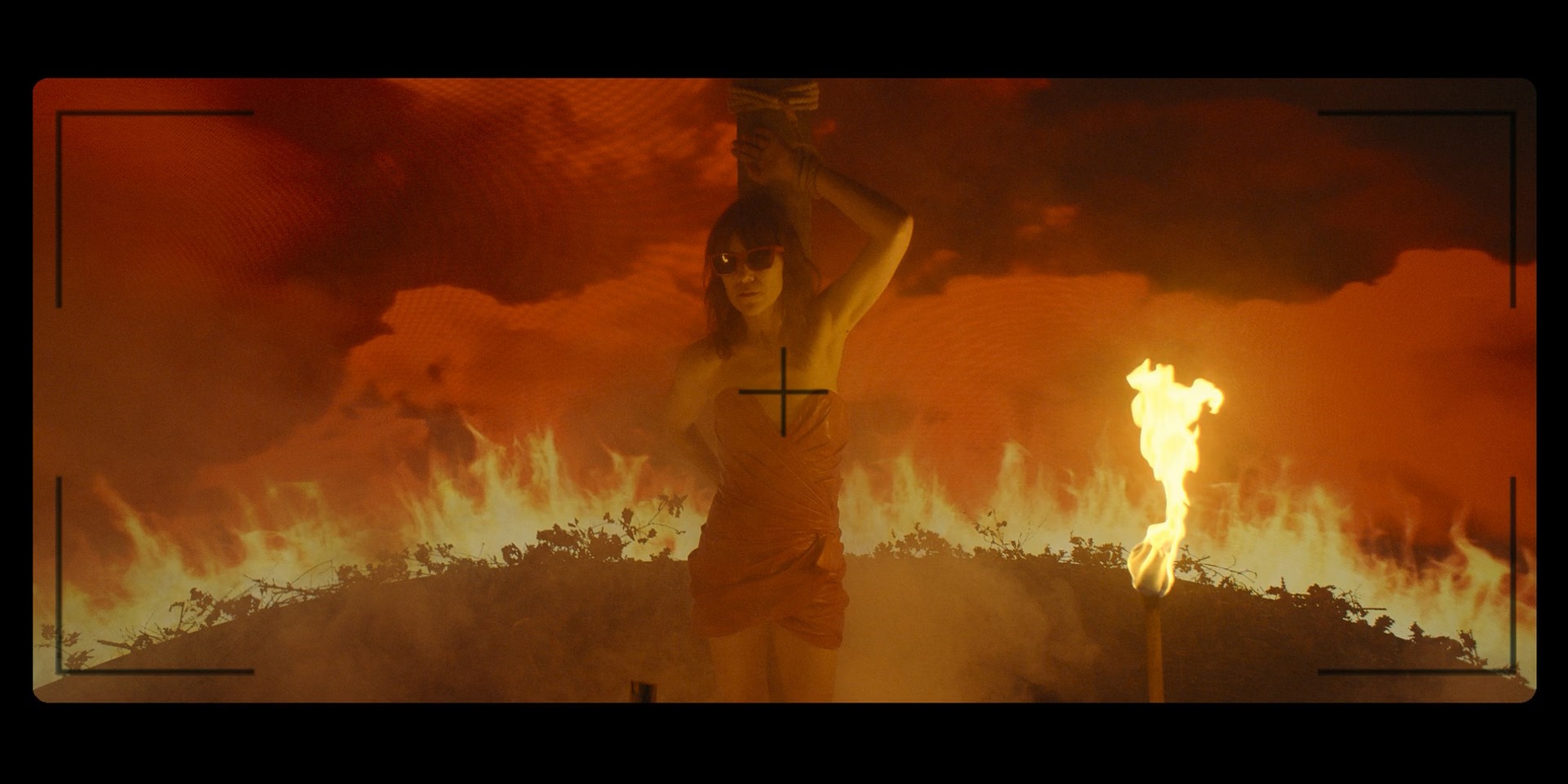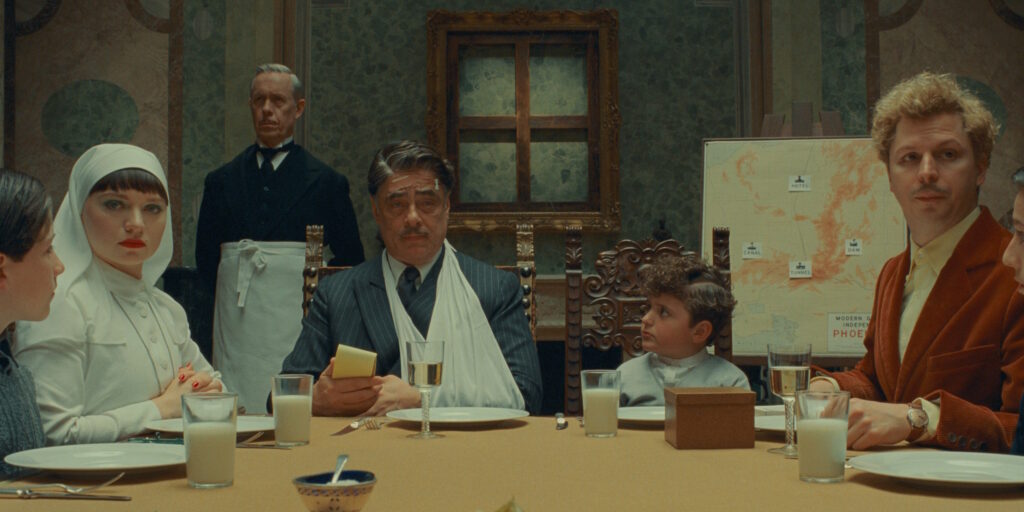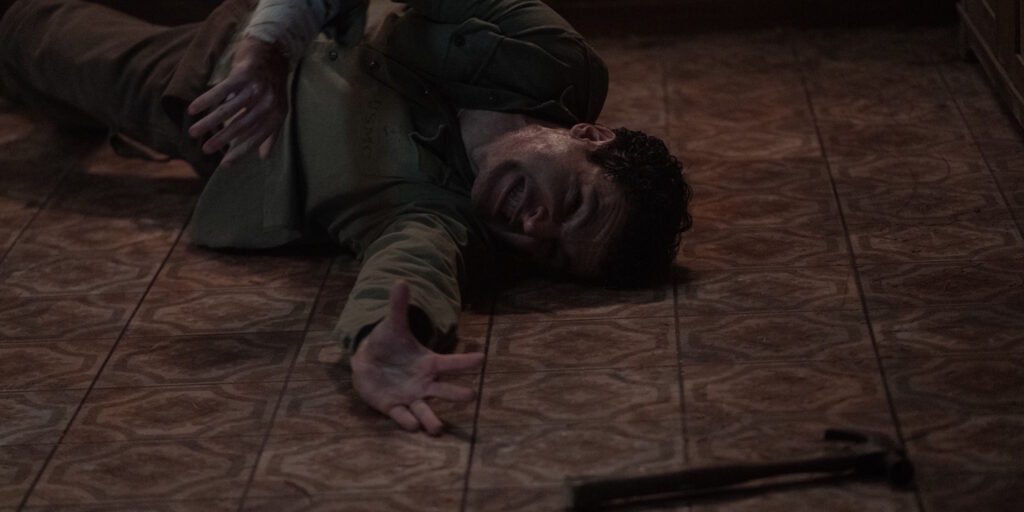[Originally published at Cinema St. Louis’ The Lens.]
Clocking in at a little more than 50 minutes (including the end credits), Gaspar Noé’s Lux Æterna just barely qualifies as a feature-length film. As one might expect of the audacious French director, however, he packs quite a lot into that modest running time. The film opens with shots lifted from Carl Th. Dreyer’s 17th-century drama Day of Wrath (1943) – and also drops in a couple of quotes from the renowned Danish filmmaker – but this cinematic invocation is somewhat mischievous on Noé’s part. Granted, the plot of Dreyer’s feature concerns women who are accused of witchcraft, and Lux Æterna is (in part) a behind-the-scenes drama about the making of an ill-fated medieval witchcraft movie, so the connection makes a nominal kind of sense.
This superficial similarity aside, however, Noé’s feature isn’t really exploring the same thematic territory as Dreyer’s quavering tale of Protestant guilt and invisible terror. Instead, Noé appears to draw inspiration from an infamous on-set incident, in which Dreyer and the rest of the film’s crew left elderly actor Anna Svierkier tied to a ladder for two hours, allegedly to enhance the “realism” of her character’s subsequent execution by burning. The notion of the auteur as a sadistic dictator – willing and even eager to put their cast and crew through any agony in the name of artistic authenticity – is one of the central ideas that Noé’s feature confronts. As Lux Æterna establishes, women often receive the brunt of such abuse, establishing a pointed resonance with the gender-skewed witchcraft panics like the one depicted in the film-within-the-film. Beyond this, Noé’s feature also shrewdly illustrates how female directors are systematically sabotaged by a system that regards their artistic ambitions with not-so-subtle contempt
However, Lux Æterna is nothing so straightforward as a reflexive, feminist-minded rebuke of the harms perpetrated and justified by the film industry. (Whether Noé even has any credibility on this score, given that he directed the notorious rape-revenge feature Irréversible, is perhaps a question better left to female critics.) In the fine tradition of many movies-about-movies – ranging from Day for Night (1973) to The Player (1992) to Tropic Thunder (2008) – Lux Æterna also functions as a droll satire of the behind-the-scenes chaos that characterizes virtually every film production. In addition, Noé’s feature is simultaneously an experimental art film, one that eventually unravels into an abstract optical assault that reportedly left viewers at the 2019 Cannes premiere staggering around in a semi-blind daze. It manages this while also being a bit of a sly parody of experimental and avant-garde filmmaking technique, which is an admittedly nifty trick and a testament to Noé’s nimble talent for keeping several balls in the air at once.
After its Dreyer-quoting prelude, the first proper scene in Lux Æterna comprises an extended conversation between a director (Béatrice Dalle) and her lead actor (Charlotte Gainsbourg). While the film’s crew makes preparations for the next scene, the pair discuss past projects and commiserate about the various joys and miseries of the industry. To a canny viewer, it quickly becomes apparent that Dalle and Gainsbourg are playing themselves, with the former reminiscing about her role on The Witches’ Sabbath (1988) and the latter alluding to her character’s climactic demise in Melancholia (2011). Although Dalle and Gainsbourg speak freely and warmly with one another, Noé puts a lightly satirical spin on the sequence by shooting it partly in a split screen, absurdly (though not pointlessly) sequestering director and actor within the frame.
After 30 years as a film actor, Dalle has finally moved behind the camera, assuming directing duties for what appears to be an anachronistic art film about medieval witch persecutions. However, her production is a troubled one. The producers deeply mistrust her and are already conspiring to remove her from the film, recruiting an assistant to follow her around with a camcorder to capture any actionable misdeed. She is at loggerheads with her cinematographer, an arrogant veteran who boasts about his past work with Godard and undermines her decision-making at every turn. No one on set except for Gainsbourg seems to respect her, including the makeup artists and costume wranglers who are huffing in disgust and already planning for their next projects.
Admittedly, Dalle does seem to be somewhat in over her head. Her directorial style is high-handed, but she is visibly frazzled, periodically retreating behind the prop walls to sob and wring her hands in despair. The actors, including Abbey Lee (herself), are frustrated with the contentious and disorganized production, which is rapidly approaching shitshow status. Meanwhile, Gainsbourg is distracted by a crisis at home, a film journalist lurks around pestering everyone, and Lee’s The Neon Demon co-star, actor-turned-wannabe-director Karl Glusman (himself), keeps picking the worst possible moments to ingratiate himself to Gainsbourg.
Conceived, written, and shot over just a few weeks, Lux Æterna nonetheless feels like an authentic and incisive glimpse into the world of a calamitous film production. Whereas Christopher Guest’s show-business satires always have a measure of affectionate warmth, Noé’s version of the same has an appropriately dry Gallic bite. The fact that the film’s performers are all playing lightly fictionalized versions of themselves certainly lends the feature an extra dose of knowing nastiness. No one escapes unscathed, including actors, directors, producers, cinematographers, journalists – all the way down to the parasitic bottom-feeders hovering around the margins. In particular, Glusman’s obsequious pitches to first Gainsbourg and then Lee come off as so cringeworthy, they feel like they must be based on real-life incidents.
Noé and cinematographer Benoît Debie rely on handheld camera work, and much of the behind-the-scenes drama is presented in a two- or three-camera split-screen format. Both techniques amplify the sense of nervous, exhausted chaos that characterizes the film production. The constant din of multilingual crosstalk also contributes in this respect, although the dialogue is often subtitled so as to to focus non-Francophone viewers on a particular interaction. The film’s brief running time flies by in a blur, but, paradoxically, the action is so anxiety-inducing that it somehow can’t move fast enough.
When the climax finally arrives, however, it turns out to be formal rather than dramatic. A deus ex machina enters the story in the form of an inexplicable lighting malfunction, leading to an extended final sequence in which the film shrugs off shaggy realism in favor of eye-melting impressionism – or, arguably, outright abstraction. Here agony gives way to ecstasy, while still preserving the sharp discomfort that one experiences when witnessing horrific on-screen distress. How can one know where performance ends and real trauma begins? Here Lux Æterna ascends (or is it descends?) into avant-garde meta-horror territory, presented with all the over-cranked sensory intensity of Noé’s even more upsetting dance movie/anti-drug PSA, Climax (2018).
Underneath its surface-level skewering of the film industry’s farcical qualities, Lux Æterna articulates an earnest if ambivalent statement about art and the sacrifices required to birth it into existence. It is less a story than a filmic essay, albeit one that sometimes seems half-formed, befitting a project that was reportedly developed via improvisation. Is the transcendence that occasionally emerges from a genuinely great work of art sufficient to justify the exorbitant costs of creating it? Is it worth the expense, the tedium, the stress, and above all the mental and physical abuse inflicted on the cast and crew? Noé might not have an answer – or he might lack the courage to forthrightly state his questionable convictions – but given how relentlessly he assaults the viewer’s senses in the final 10 minutes of Lux Æterna, he clearly wants us to ponder the question.
[Note: As the film’s opening disclaimer warns, Lux Æterna features intense sequences of flashing lights. Epileptic or otherwise photo-sensitive viewers might want to sit this one out.]
Lux Æterna screens nightly at 7:30 p.m. from June 24 – 26 at the Webster University Film Series.




